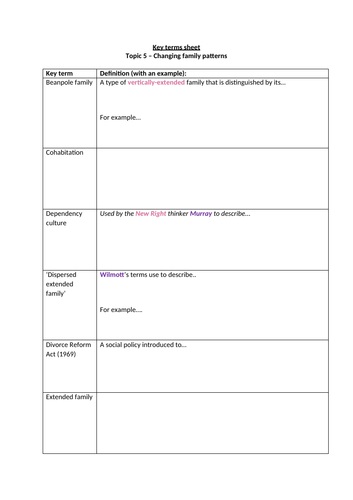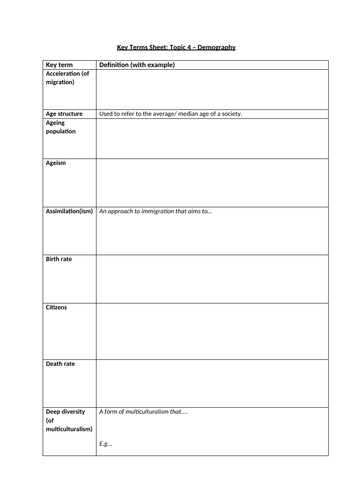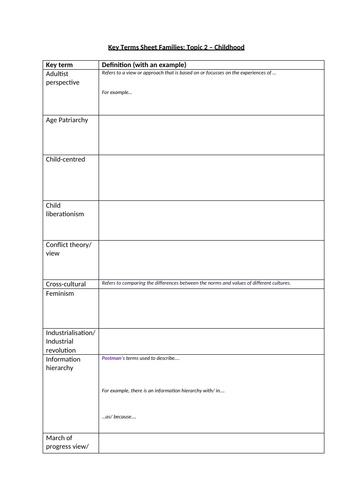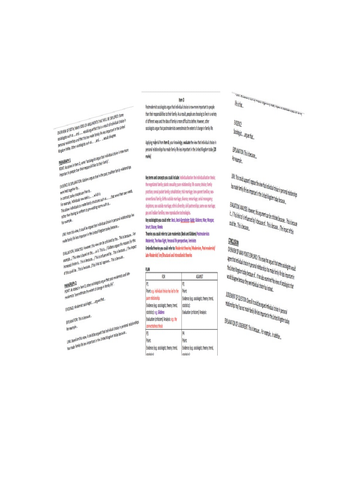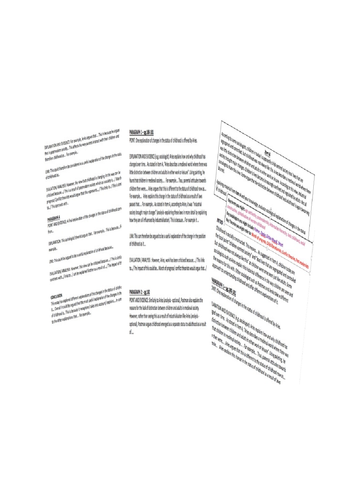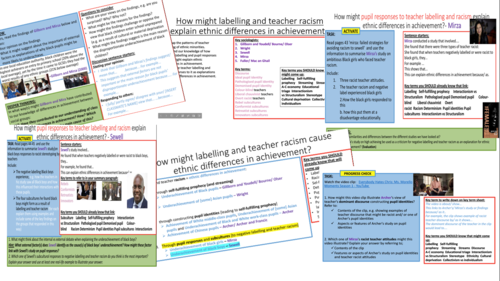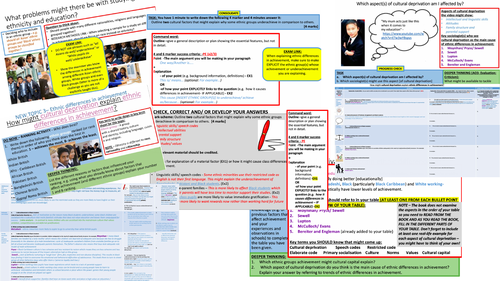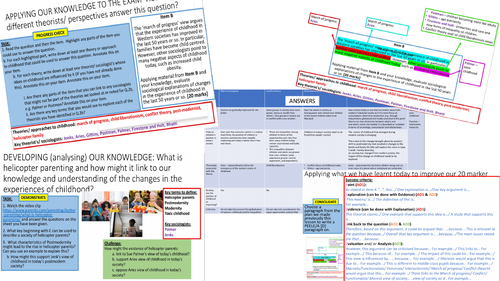
111Uploads
12k+Views
3k+Downloads
All resources

KEY TERMS SHEET - AQA A-level Sociology Education: Topic 2 Class differences in achievement (in)
Alphabetical key term sheet for AQA A-level Sociology Education Topic 2 Class differences in achievement (internal factors) that requires students to fill out the definitions themselves.
*** Includes scaffolding, e.g. a few sentence starters (to model to students how to incorporate key sociologists into their definitions)
*** Includes a section with key terms that students should know from previous learning.
Good form of revision for students and can be used as a revision resource to develop AO1 once filled out.
**BASED ON CONTENT textbook - AQA A Level Sociology Book One Including AS Level: Book one 3rd Revised edition by Rob Webb, Hal Westergaard, Keith Trobe, Annie Townend ’ textbook

KEY TERMS SHEET - AQA A-level Sociology Education: Topic 1 Class differences in achievement (ex)
Alphabetical key term sheet for AQA A-level Sociology Education Topic 1 Class differences in achievement (external factors) that requires students to fill out the definitions themselves.
*** Includes scaffolding, e.g. a few sentence starters (to model to students how to incorporate key sociologists into their definitions)
*** Includes a section with key terms that students should know from previous learning(links to key terms covered in class differences in achievement, e.g. labelling, pupil identities, material deprivation, speech codes etc) that link to this topic. **
Good form of revision for students and can be used as a revision resource to develop AO1 once filled out.
**BASED ON CONTENT textbook - AQA A Level Sociology Book One Including AS Level: Book one 3rd Revised edition by Rob Webb, Hal Westergaard, Keith Trobe, Annie Townend ’ textbook

KEY TERMS SHEET - AQA A-level Sociology Education: Topic 4 Gender differences in achievement
Alphabetical key term sheet for AQA A-level Sociology Education Topic 4 Gender differences in achievement that requires students to fill out the definitions themselves.
*** Includes some prompts to help students remember how key term links to the topic, *e.g. divides key terms into those use in: gender differences in achievement, gender differences in subject choice and pupils’ sexual and gender identities ***
*** Includes a section with key terms that students should know from previous learning (links to key terms covered in class differences in achievement, e.g. labelling, pupil identities, etc) that link to this topic. **DOES NOT INCLUDE IN TABLE key terms covered in Topic 1 & 2 Class diff key term sheet.
Good form of revision for students and can be used as a revision resource to develop AO1 once filled out.
**BASED ON CONTENT textbook - AQA A Level Sociology Book One Including AS Level: Book one 3rd Revised edition by Rob Webb, Hal Westergaard, Keith Trobe, Annie Townend ’ textbook

KEY TERMS SHEET - AQA A-level Sociology Education: Topic 3 Ethnic differences in achievement
Alphabetical key term sheet for AQA A-level Sociology Education Topic 3 ethnic differences in achievement that requires students to fill out the definitions themselves.
*** Includes scaffolding, e.g. some sentence starters (to model to students how to incorporate key sociologists into their definitions) and prompts to help students remember how key term links to the topic. **
*** Includes a section with key terms that students should know from previous learning(links to key terms covered in class differences in achievement, e.g. labelling, pupil identities, material deprivation, speech codes etc) that link to this topic. **
DOES NOT INCLUDE IN TABLE key terms covered in Topic 1 & 2 Class diff key term sheet.
Good form of revision for students and can be used as a revision resource to develop AO1 once filled out.
**BASED ON CONTENT textbook - AQA A Level Sociology Book One Including AS Level: Book one 3rd Revised edition by Rob Webb, Hal Westergaard, Keith Trobe, Annie Townend ’ textbook

KEY TERMS SHEET - AQA A-level Sociology Families: Topic 5 Changing family patterns
Alphabetical key term sheet for AQA A-level Sociology Family Topic 5 Changing family patterns that requires students to fill out the definitions themselves. Includes some sentence starters for more difficult key terms.
**Good form of revision for students and can be used as a revision resource to develop AO1 once filled out. **
**BASED ON CONTENT in textbook - AQA A Level Sociology Book One Including AS Level: Book one 3rd Revised edition by Rob

KEY TERMS SHEET - AQA A-level Sociology Families: Topic 4 Demography
Alphabetical key term sheet for AQA A-level Sociology Family Topic 4 Demography that requires students to fill out the definitions themselves. Includes some sentence starters and two definitions for more difficult key terms.
Good form of revision for students and can be used as a revision resource to develop AO1 once filled out.
**BASED ON CONTENT in textbook - AQA A Level Sociology Book One Including AS Level: Book one 3rd Revised edition by Rob Webb, Hal Westergaard, Keith Trobe, Annie Townend ’ textbook

KEY TERMS SHEET - AQA A-level Sociology Families: Topic 3 Theories of the family
Alphabetical key term sheet for AQA A-level Sociology Family Topic 3 Theories of the family that requires students to fill out the definitions themselves - models example, and includes some sentence starters for more difficult key terms.
**Good form of revision for students and can be used as a revision resource to develop AO1 once filled out.
**
**Makes links (and encourages students to add) to key terms students should have learnt previously - BASED ON STUDENTS ALREADY HAVING PRIOR KNOWLEDGE of Functionalism, Marxism and Feminism - see intro lessons.
**
**BASED ON CONTENT in textbook - AQA A Level Sociology Book One Including AS Level: Book one 3rd Revised edition by Rob Webb, Hal Westergaard, Keith Trobe, Annie Townend ’ textbook

KEY TERMS SHEET - AQA A-level Sociology Families: Topic 2 Childhood
Alphabetical key term sheet for AQA A-level Sociology Family Topic 2 Childhood that requires students to fill out the definitions themselves. Includes some sentence starters for more difficult key terms.
**Good form of revision for students and can be used as a revision resource to develop AO1 once filled out. **
**BASED ON CONTENT in textbook - AQA A Level Sociology Book One Including AS Level: Book one 3rd Revised edition by Rob Webb, Hal Westergaard, Keith Trobe, Annie Townend ’ textbook
Bundle

PREPARING FOR THE EXAM - Family Revision and Essay Writing Bundle
Bundle includes:
Family PLC - EDITABLE - Personal Learning Checklist for the Families and Households unit in the the AQA A-level Sociology syllabus. PLC includes topic and page numbers from the Westergaard and Townsend book one for content students my find hard to locate.
Revision lessons that recaps content and/ or focusses on developing exam techniques for family topics 1-7:
-Topic 1 - Couples - also focusses on exam techniques - AO1, AO2 & AO3
-Topic 2 - Childhood
-Topic 3 - Theories of the family - focusses on AO1 & AO3
-Topic 4 - Demography - briefly focusses on all AOs but mainly AO2 for 10 markers
-Topic 5 - Changing Family patterns - focusses on AO2
-Topic 6 - Family diversity
-Topic 7 -Families and Social policy - focusses on planning essays using the item.
Five writing frames for 20 markers on family topics 2-6:
Detailed writing frame that scaffolds (from introduction to conclusion) a full answer for a 20 marker on:
-Topic 2 - Childhood - evaluate explanations of childhod
-Topic 3 - Theories of the family - whether the family is beneficial
-Topic 4 - Demography - position of the old
-Topic 5 - Changing family patterns -divorce
-Topic 6 - Family diversity - whether individual choice in personal relationships has made family life less important
Writing frames:
Supports students with planning the 20 marker (using the item) - using planning success criteria.
Outlines the success criteria and provides sentence starters for the full essay (intro, main body and conclusion). Success criteria used for paragraphs in main body of essay is PEELE/A**
-Outlines the key terms, sociologists, theories that can be used when answering the question.**
-Supports students who need support and guidance with writing essays whilst providing students who are already good at writing essays opportunities to further improve their essay skills. **
Bundle

WRITING FRAMES (for improving essay writing) - AQA A-level Sociology: Families – Topics 2-6 20 marker
Detailed writing frame that scaffolds (from introduction to conclusion) a full answer for a 20 marker on:
Topic 2 - Childhood - evaluate explanations of childhod
Topic 3 - Theories of the family - whether the family is beneficial
Topic 4 - Demography - position of the old
Topic 5 - Changing family patterns -divorce
Topic 6 - Family diversity - whether individual choice in personal relationships has made family life less important
*** Based on AQA specification**
*** Supports students with planning the 20 marker (using the item) - using planning success criteria.
**
*** Outlines the success criteria and provides sentence starters for the full essay (intro, main body and conclusion). Success criteria used for paragraphs in main body of essay is PEELE/A**
*** Outlines the key terms, sociologists, theories that can be used when answering the question.**
*** Supports students who need support and guidance with writing essays whilst providing students who are already good at writing essays opportunities to further improve their essay skills. **

WRITING FRAME - AQA A-level Sociology: Families – Topic 6 Family diversity 20 marker
Detailed writing frame that scaffolds (from introduction to conclusion) a full answer for a 20 marker on evaluating the view that individual choice in personal relationships has made family life less important in the United Kingdom today (family -topic 6 family diversity).
*** Based on AQA specification**
Models and supports students with how to use the item to select points or arguments to answer the question and how to plan essays using planning success criteria.
Outlines the success criteria and provides sentence starters for the full essay (intro, main body and conclusion). Success criteria used for paragraphs in main body of essay is PEELE/A
Outlines the key terms, sociologists, theories that can be used when answering the question.
Supports students who need support and guidance with writing essays whilst providing students who are already good at writing essays opportunities to further improve their essay skills.

WRITING FRAME - AQA A-level Sociology: Families – Topic 4 Demography (position of old) 20 marker
Detailed writing frame that scaffolds (from introduction to conclusion) a full answer for a 20 marker on whether the posiiton of the old is changing for the better. (family -topic 4 demography).
*** Based on AQA specification**
Models and students with how to use the item to answer essays.
Outlines the success criteria and provides sentence starters for the full essay (intro, main body and conclusion). Success criteria used for paragraphs in main body of essay is PEELE/A
Outlines the key terms, sociologists, theories that can be used when answering the question.
Supports students who need support and guidance with writing essays whilst providing students who are already good at writing essays opportunities to further improve their essay skills.

WRITING FRAME - AQA A-level Sociology: Families – Topic 3 Theories of the family 20 marker
Detailed writing frame that scaffolds (from introduction to conclusion) a full answer for a 20 marker on the family being beneficial (family -topic 3 theories of the family). Models how to use the item to select points or arguments to answer the question.
*** Based on AQA specification**
Supports students with planning the 20 marker (using the item) - using planning success criteria.
Outlines the success criteria and provides sentence starters for the full essay (intro, main body and conclusion). Success criteria used for paragraphs in main body of essay is PEELE/A
Outlines the key terms, sociologists, theories that can be used when answering the question.
Supports students who need support and guidance with writing essays whilst providing students who are already good at writing essays opportunities to further improve their essay skills.

WRITING FRAME - AQA A-level Sociology: Families – Topic 2 Childhood 20 marker
Detailed writing frame that scaffolds (from introduction to conclusion) a full answer for a 20 marker on divorce (family -topic 2 childhood. Models how to use the item to select points or arguments to answer the question.
*** Based on AQA specification**
*Outlines the success criteria and provides sentence starters for the full essay (intro, main body and conclusion). Success criteria used for paragraphs in main body of essay is PEELE/A
Outlines the key terms, sociologists, theories that can be used when answering the question.
Supports students who need support and guidance with writing essays whilst providing students who are already good at writing essays opportunities to further improve their essay skills.
PAGE NUMBERS From Webb et al Book 1 textbook included for 3/4 of paragraphs in main body.

WRITING FRAME - AQA A-level Sociology: Families – Topic 5 Changing patterns (divorce) 20 marker
Detailed writing frame that scaffolds (from introduction to conclusion) a full answer for a 20 marker on divorce (family -topic 5 changing family patterns). Models how to use the item to select points or arguments to answer the question.
*** Based on AQA specification**
Supports students with planning the 20 marker - using planning success criteria.
Outlines the success criteria and provides sentence starters for the full essay (intro, main body and conclusion). Success criteria used for paragraphs in main body of essay is PEELE/A
Outlines the key terms, sociologists, theories that can be used when answering the question.
Supports students who need support and guidance with writing essays whilst providing students who are already good at writing essays opportunities to further improve their essay skills.
Bundle

AQA A-level Sociology Revision lessons for family unit
Detailed and differentiated (up and down) revision lessons for each topic within the family unit of AQA specification. Includes:
Topic 1 - Couples - also focusses on exam techniques - AO1, AO2 & AO3
Topic 2 - Childhood
Topic 3 - Theories of the family - focusses on AO1 & AO3
Topic 4 - Demography - briefly focusses on all AOs but mainly AO2 for 10 markers
Topic 5 - Changing Family patterns - focusses on AO2
Topic 6 - Family diversity
Topic 7 -Families and Social policy - focusses on planning essays using the item.

AQA A-level Sociology: Education Topic 3 Ethnic differences - Negative labelling and teacher racism
Detailed and differentiated (up and down) student led lesson that explores the following so students are able to understand and explain how negative labelling and teacher racism might cause ethnic differences in achievement:
Ideal pupil identity , Pathologised pupil identity, Demonised pupil identity, Colour-blind teachers, Liberal chauvinist teachers, Overt racist teachers, Rebels subcultures, Conformist subcultures, Retreatist subcultures, Innovators subcultures
Differentiates between Gillborn and Youdell (or Bourne or Olser), Sewell, Mirza’s view of how teachers might be racist and how this might affect achievement for different groups.
Lesson makes links to the following terms that students should have covered before completing this lesson: Labelling, Self-fulfilling prophecy, Streaming, Streams A-C economy, Educational triage, Interactionism vs Structuralism, Stereotype, Ethnicity Cultural deprivation Collectivism vs individualism.
**NOTE – Students will need to have basic to reasonable knowledge of labelling and the self-fulfilling prophecy. **
Uses and refers to ’ AQA A Level Sociology Book One Including AS Level: Book one 3rd Revised edition by Rob Webb, Hal Westergaard, Keith Trobe, Annie Townend ’ textbook
RESOURCES CAN BE FOUND AT THE END OF THE PPT.

AQA A-level Sociology: Education Topic3 Ethnic differences -Material deprivation & racism in society
Detailed and differentiated (up and down) student led lesson on how a. material deprivation and b. racism in wider society might cause ethnic differences in achievement. Makes reference to key terms material vs cultural factors, external vs internal factors, the meaning/ patterns of ethnic differences in achievement.
Uses and refers to ’ AQA A Level Sociology Book One Including AS Level: Book one 3rd Revised edition by Rob Webb, Hal Westergaard, Keith Trobe, Annie Townend ’ textbook
RESOURCES CAN BE FOUND AT THE END OF THE PPT.
ANSWERS FOR MAIN ACTIVITIES CAN BE FOUND ON NEXT SLIDE AFTER ACTIVITY SLIDE
INCLUDES ORACY ACTIVITY

AQA A-level Sociology: Education Topic 3 Ethnic differences - Cultural deprivation
Detailed and differentiated (up and down) student led lesson that introduces students to ethnic differences in achievement and explores how different aspects of cultural deprivation (language, attitudes and values, and parental structure) might cause ethnic differences in achievement. To do this, the lesson explores the following key terms: ethnic group, ethnic differences in achievement, cultural deprivation, compensatory education and makes reference to other key terms students should have previously learnt (restricted code, working-class subculture, meritocracy, internal vs external factors, cultural vs material factors)
Uses and refers to ’ AQA A Level Sociology Book One Including AS Level: Book one 3rd Revised edition by Rob Webb, Hal Westergaard, Keith Trobe, Annie Townend ’ textbook
RESOURCES CAN BE FOUND AT THE END OF THE PPT.
ANSWERS FOR MAIN ACTIVITY CAN BE FOUND ON NEXT SLIDE AFTER ACTIVITY SLIDE
*STUDENT FRIENDLY MARK-SCHEME FOR 4 MARKER INCLUDED

AQA A-level Sociology: Families Topic 2 ‘Childhood’ Revision lesson
Detailed and differentiated (up and down) student led lesson that supports students in recapping the main theories, views and explanations of the position of childhood; examines how march of progress, conflict, child liberationists and postmodernist theories’ view society and how this might influence their approach or view of childhood and its changes over time. Also highlights the key sociologists (Katz, Postman, Aries, Palmer, Jenks, Gittens) in this topic.
The lesson then requires students to apply this knowledge to plan (using a success criteria) a 20 marker and write at least one paragraph for it.
RESOURCES CAN BE FOUND AT THE END OF THE PPT.
MODEL PLAN AND ANSWERS FOR MAIN ACTIVITY CAN BE FOUND ON NEXT SLIDE AFTER ACTIVITY SLIDE





